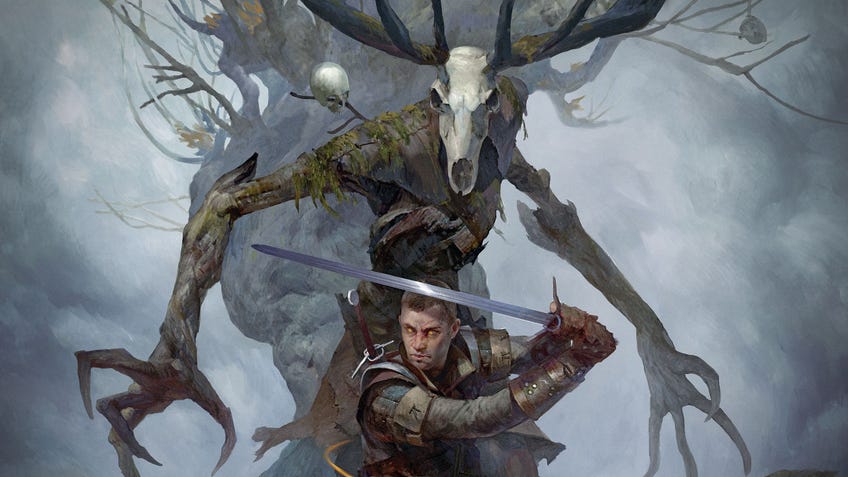What are you playing this weekend? Here’s what we’ve been playing!
Prepare for a healthy dose of The Witcher content!
It’s that time of the week again! Our latest entry in the What We’ve Been Playing series has the team discussing tabletop RPGs, award-winning deckbuilding games and adventure titles set in the world of The Witcher.
Whilst both Matt and Meehan give their thoughts on The Witcher: Old World - a board game based on the video game series developed and published by CD Projekt Red - Wheels shares his feelings of 2023 Spiel des Jahres winner Challengers! and Maddie continues her journal on her adventures in the dark world of Symbaroum.
If you’ve been playing something you’ve been enjoying - or even hating! - or if you're planning to play a game you’re excited about, then please share in the comments below or tweet at us @joindicebreaker.
What We’ve Been Playing - July 21st 2023
The Witcher: Old World
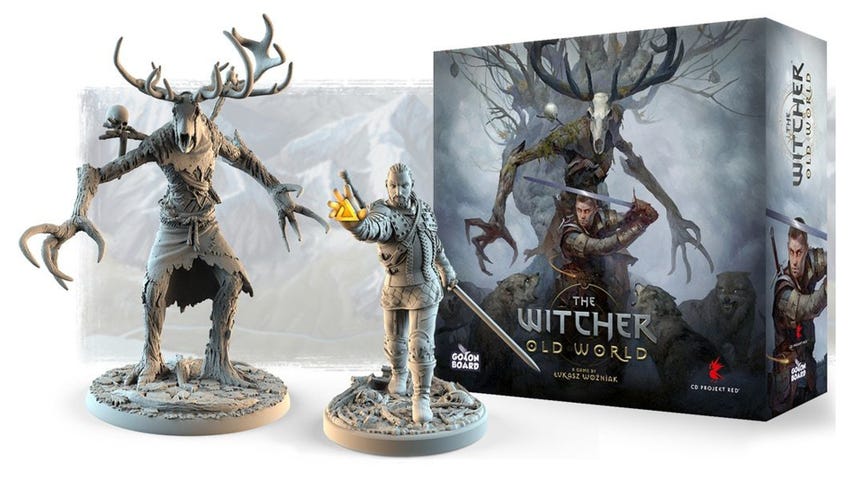
Video game board games are two-a-penny nowadays. Good video game adaptations, less so. So I was intrigued by the recent buzz around The Witcher: Old World, the latest tabletop take on the fantasy books-turned-video games-turned-TV show that blew up on Kickstarter a couple of years back.
Old World takes the adventurous feel of The Witcher - particularly the open-world exploration of video games like The Witcher 3 - and builds it out into a board game about venturing across the Continent in search of monsters to slay. Each player is a competing witcher, out to claim the heads of four monsters as trophies - or potentially their rivals, as you can battle fellow witchers - fastest by tracking them down and defeating them in combat.
The Witcher: Old World is refreshingly, surprisingly streamlined in the age of bloated Kickstarter games. While there were a bunch of expansions offered as part of its crowdfunding run (we played the base game, sans add-ons), the core game builds on a fairly light loop: move between places on the world map, before either exploring them or doing battle.
Driving the action and players’ decisions are their individual decks of cards, which they build up over the course of the game in a deckbuilding-lite fashion, adding a new card each round to their pile. These cards can be used to travel or to fight, with the size of your deck doubling as your health pool in fights. It’s a smart way of using the same cards in different situations, which combines with the highlight of Old World: a combo-driven combat system that encourages players to chain together cards from their hand to pull off whirling blows, spells and strikes to bring down their opponent.
It feels satisfying, and encourages exploring the world for a few rounds to build up your cards and stats rather than rushing into battle with a harpy or griffin (as I found out on my first turn). Exploration is given a light choose-your-own-adventure feel as players choose to explore the city or wilds of each location, pulling random exploration cards that typically offer a bit of narrative followed by a branching decision - which might bring reward, punishment or the thread of a new quest.
The narrative is light, but effective enough - don’t expect anything too deep, just a sprinkle of Witcher flavour on top of the central move-then-quest-or-fight cycle. There are some other similarly light additions, such as the option to play a simplified dice poker against locals or other players for gold, and the ability to obtain potions and equipment to help in your next battle.
What Old World lacks in the rich world, deep gameplay and immersive storytelling of its video game peers, it makes up for with an approachable just-enough mixture of each of those aspects. The clever card-combining combat is definitely the standout element, but it’s couched in enough game around its edges to make Old World a worthwhile time for those after a breezy fantasy adventure - especially if you’re a Witcher fan.
Matt
Challengers!
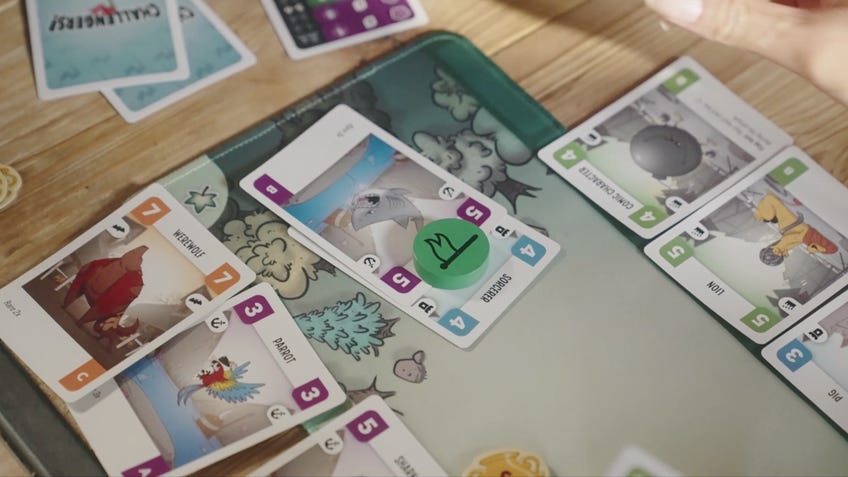
After winning the coveted Spiel des Jahres 2023 award Maddie, Liv, and I sat down to play Challengers! from 1 More Time Games. In Challengers! up to eight players compete in an epic, seven round capture the flag tournament, attempting to earn enough fans to reach the final and take home the gold. They’ll start with a small deck of contestants on their team, from coveted champs to scrawny little newcomers, and on each round before their match, players will be able to draft new cards from increasingly powerful decks of cards.
It’s a deckbuilding game in the lightest sense, with only a few cards entering your collection in between rounds and as many as you like being discarded. You’ll be drafting from a few different card sets that have all been merged together which will have you pulling hands that consist of mediaeval pig farmers, carnival clowns and giant dinosaurs.
As each game starts, you and your pre-assigned opponent will flip cards from the top of your deck to try and claim the flag from each other - matching or beating the power of their flag bearer. It’s not a super in-depth tactical game, especially to begin with. But as you build synergies into your deck and add card effects that allow you to start manipulating and gambling on the outcomes, it gets genuinely tense!
Is it worthy of a game of the year award? I’m not sure about that. But you can check out our full let’s play on the Dicebreaker YouTube channel!
Wheels
Symbaroum
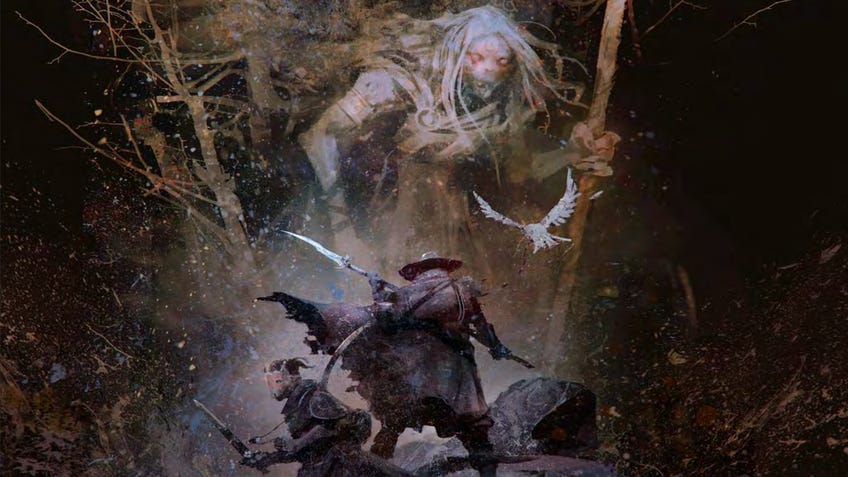
I’m still playing Symbaroum, the dark fantasy RPG from Free League Publishing. We’re unravelling a mystery of tainted forces living under the town and this session we finally got into some combat. I’ve been excited to try out my spells as Symbaroum does something a little different in that all magic comes at a price. Every time you cast anything, you’re also battling corruption. As a priestess I blasted some abominations with holy fire, then rolled to get points of temporary corruption - it’s a careful balance of using powerful magic versus not succumbing to the darkness. I’m interested to see how far my character pushes things, to see what lies at the bottom of the tainted well, and to learn more about this spooky world.
Maddie
The Witcher: Old World
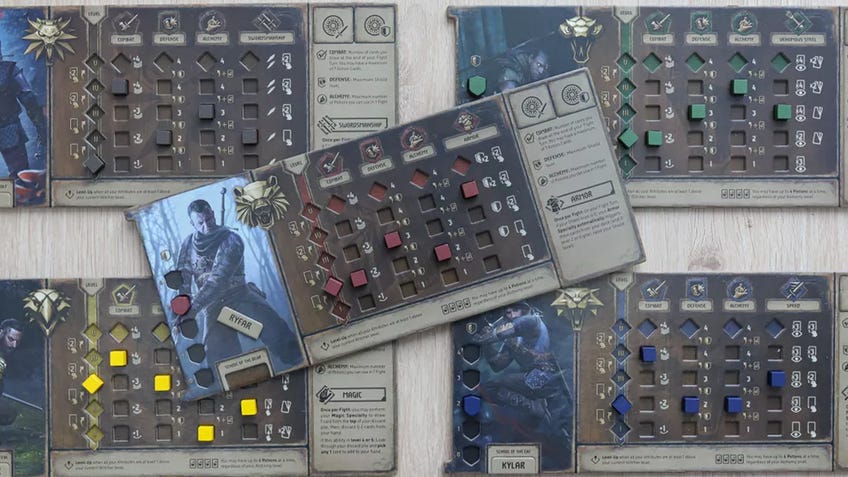
Yes, Matt and I may be writing about the same board game this week - however, we often have very different perspectives, so I figured it was worth offering my thoughts on The Witcher: Old World.
This appears to be a board game that’s caught the buzz of the community, despite being announced quite a while ago. Having now played a digital version of the title via Tabletop Simulator, I can see why: though I don’t necessarily agree that The Witcher: Old World deserves all that much excitement.
The concept of Old World should be incredibly appealing to me, considering it’s based on The Witcher video games published by CD Projekt Red - a series I’ve enjoyed playing - rather than the original books by Andrzej Sapkowski, and that it takes place during a time before Geralt of Rivia slaughtered and seduced his way across the Continent. I’ve always been fascinated with the other Witcher schools outside of The Wolf and the idea of a collection of rival witchers operating in the same space, so I was hoping that the Old World would satiate that interest.
However, I feel that the title doesn’t take full advantage of its setting. Though there are some minor narrative events you can experience, they’re confined to these brief encounter cards that will sometimes evolve into wider quests, but often won’t go further than another brief card. One particularly hilarious example of this was when my character accepted the invitation to speak to someone about acquiring a new horse - only for the next card to literally just be a horse. The quest system in Old World feels disappointingly underdeveloped, considering that a big appeal of The Witcher video games are its narratively-rich questlines. I wish that more focus had been put into Old World’s quests, almost along the same lines as Sleeping Gods: a narrative board game that absolutely nails the feeling of following a series of overarching and engrossing questlines.
The rest of the Old World mostly consists of travelling between various locations across the Continent in order to perform a series of smaller actions - such as gambling with the locals and improving stats - and challenging either monsters or other witchers to fights. The combat system of Old World is one of its stronger aspects - reimagining the video game’s sword-and-sorcery gameplay via deckbuilding. During fights, players choose to play any number of cards from their hand as long as they form a combo: which requires matching coloured tabs. The more impressive the combo, the more damage they deal/cards they draw/or other benefits they receive.
Fighting monsters sees the player to the active player’s right acting as the monster, selecting either bite or charge before drawing cards from a monster deck and applying the associated effects. Whilst fighting other witchers is a player-versus-player experience that has the two people facing off against each other using their respective decks. As players complete their turns, they’ll be able to acquire new cards - thereby increasing their deck size, which also acts as their health-pool, and gaining access to better abilities. The game manages player progression very well, with people gradually being able to take on more dangerous monsters and perform more actions later on.
Though the combat mechanics work well, it still feels like designer Łukasz Woźniak missed the mark. There’s the makings of a great adventure board game here, but it feels tied-down by the need for a simple win condition - gaining trophies through fighting and improving skills - and a by-the-numbers structure. I wonder what would have happened if Old World was allowed to be something more daring that had players following extensive questlines, making morally-challenging decisions and meeting engaging characters - similarly to the video game series it’s based on. However, if you’re a fan of The Witcher series, you could do a lot worse than Old World.
Meehan
